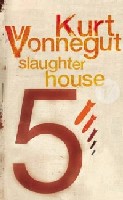
Andy's Anachronisms - Time Travel Book Reviews

Slaughterhouse-Five
Kurt Vonnegut
©1969


Slaughterhouse-Five
Kurt Vonnegut
©1969
|
SUMMARY In Slaughter House Five, Billy Pilgrim finds himself unstuck in time jumping between several periods of his life. Travelling between his experience as a prisoner of war in World War II to his suburban family life in the 1950s and 1960s, and his experience as a human specimen in an alien zoo on a distant planet, Billy seemingly has no control over these transitions. REVIEW Vonnegut's writing has always defied traditional classification and Slaughterhouse-Five is a prime example of this as it combines a mix of social satire, science fiction, anti-war sentiment as well as great deal of autobiographical detail. The full title-page of Slaughterhouse Five is perhaps the most revealing and apt description of the book in addition to giving us some insight into the author's mind-set behind its creation.
Billy Pilgrim's "telegraphic schizophrenic" shifts from one period of his life to another is his own defence mechanism in dealing with (or avoiding dealing with) the traumatic experiences in his life. Vonnegut has acknowledged that the only way in which he could tell his story of surviving the fire-bombing of Dresden was in this fragmented manner and that it refused to come out as a linear story when he attempted to tell it as such. What is amazing to me about Slaughterhouse Five is that Vonnegut manages to fit so much into one story. While writing a brilliant satire on the absurdity of war on par with Joseph Heller's Catch-22, Vonnegut also manages to put a human face on the tragedy at Dresden and expose one of World War II's darker moments to the general public in an accessible form. While the fragmented nature of time in the novel is largely a thematic device used by Vonnegut to contrast the different events in Billy Pilgrim's life, Vonnegut also contemplates the nature of time and fate in the book. After Billy meets with the Tralfamadorian's and they explain the nature of time from their own perception, Billy is able to accept his wanderings in time. Having visited his own death on numerous times he is no longer frightened by it and has come to accept it. With regard to fate, Vonnegut seems to argue that life is easier to live if we, like Billy Pilgrim accept that what will happen has already happened and that we are not in control of our own destiny. This absence of responsibility for our actions could in itself spark an entirely separate philosophical and religious debate that I don't intend to entertain in the space provided here. Suffice it to say that it's an interesting proposition and one that can be seen as a recurring theme in time travel literature. With regard to time travel and the nature of time, my argument of late has been that if the past is immutable and cannot be changed by the time traveller, then it tends to suggest that fate exists. My logic being that assuming time is linear (which it may not be), our present is the future's past so if we can't change our past the future cannot change its own past (our present). Confused yet? Anyhow, its just an aside that I thought I would mention in light of the themes raised in Slaughterhouse Five. Vonnegut's other work that deal's largely with the nature of time is Timequake [1996] and is well worth the read. You may also want to check out my review of the movie version of Slaughterhouse Five [Click Here for Review of Movie], directed by Roy Hill. I personally feel there is no substitution to reading the book. I think Kurt Vonnegut Jr. would agree. In a excerpt from the preface to From Between Time and Timbuktu or Prometheus-5: a space fantasy based on materials by Kurt Vonnegut, Jr. (New York: Delacorte Press/Seymour Lawrence, 1972, pp. xii-xvii). he talks about the difference between books and movies and why he feels that people tend to watch movies over books. "I have become an enthusiast for the printed word again. I have to be that, I now understand, because I want to be a character in all of my works. I can do that in print. In a movie, somehow, the author vanishes. Everything of mine which has been filmed so far has been one character short, and the character is me." A very compelling argument. Go read the book. ©2001 - A. Taylor
Review Posted: 2001-05-10
R E L A T E D L I N K S The Vonnegut Web Chris Huber's extensive web site for all things Vonnegut will keep you busy browsing for hours. From interviews with Kurt Vonnegut to a page devoted to Vonnegut's alter ego Kilgoure Trout there is something here for everyone. Quotes, Critical Bibliography, a Family History, a timeline of the Author, as well as the usual list of books and reviews. http://www.vonnegutweb.com Bombing of Dresden Overview of the Dresden bombing of February 13th, 1945 from the Spartacus Educational website. Includes some quotes from eyewitnesses and those involved in the decision to bomb the city, such as British Air Marshall Arthur Harris and British Prime Minister Winston Churchill. Touches upon the controversy of whether it was a necessary air raid or not. http://www.spartacus.schoolnet.co.uk/2WWdresden.htm
Return to Book Review Index
Return to Andy's Anachronisms Home You are visiting: http://www.timetravelreviews.com/books/vonnegut_slaughterhouse5.html
|